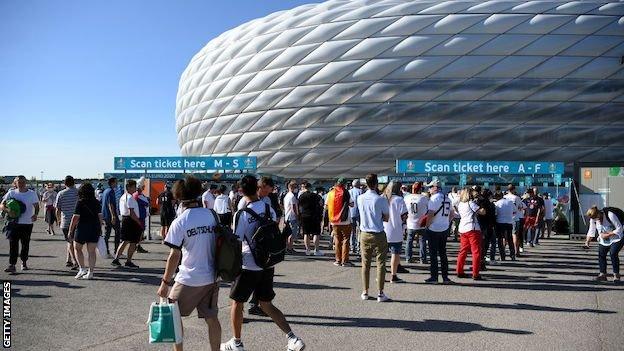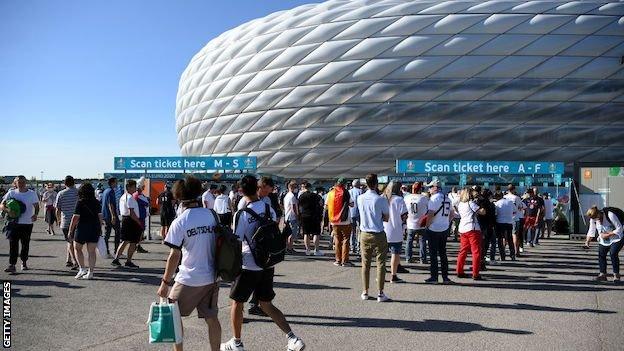

Uefa has declined a request to light up the Allianz Arena in rainbow colours before Germany’s Euro 2020 match against Hungary on Wednesday.
Munich mayor Dieter Reiter made the request in protest against a new law in Hungary that bans the sharing of any content seen as promoting homosexuality and gender change to under-18s.
Uefa says it denied the request because of the “political context”.
It has instead proposed alternative dates for the stadium to be lit up.
In a statement, European football’s governing body said: “Uefa understands that the intention is also to send a message to promote diversity and inclusion – a cause, which Uefa has been supporting for many years – having joined forces with European clubs, national teams and their players, launching campaigns and plenty of activities all over Europe to promote the ethos that football should be open to everyone.
“And consequently, Uefa has proposed alternative dates for the illumination which align better with existing events.
“Racism, homophobia, sexism, and all forms of discrimination are a stain on our societies – and represent one of the biggest problems faced by the game today. Discriminatory behaviour has marred both matches themselves and, outside the stadiums, the online discourse around the sport we love.”
Germany goalkeeper Manuel Neuer will be allowed to wear his rainbow captain’s armband during the game.
Uefa has proposed to Munich to light the stadium in rainbow colours on either 28 June – the Christopher Street Liberation Day – or between 3-9 July which is the Christopher Street Day week in Munich.
Christopher Street Day is an annual LGBTQ+ celebration held annually in cities across Germany and Switzerland, held in memory of the Stonewall Riots in New York in 1969. It is the countries’ counterpart to Pride.
On Monday, the German football association (DFB) said it would also prefer any such protest to be held on a date other than Wednesday.
Last week, Hungary passed the law that would ban LGBT literature for minors, including educational material, and advertisements deemed to be promoting gay rights.
Hungary’s government does not recognise gay marriage and has a law restricting gay adoption.
Peter Szijjarto, the country’s foreign minister, who had previously said that “mixing politics and sport” was “harmful and dangerous”, has welcomed Uefa’s decision.
“The leadership of Uefa made the right decision by not assisting in a political provocation against Hungary,” he told AFP.
“Thank God common sense remains among the leaders of European football.”
Uefa’s decision comes days after it launched an investigation into “potential discriminatory incidents” during Hungary’s matches against Portugal and France.
During their opener against Portugal at Budapest’s Puskas Arena, homophobic banners were displayed by fans.
On Saturday, before the France match, fans marched to the ground with a banner telling players to stop taking a knee to protest against racism.
Germany host Hungary in their final Group F match on Wednesday (20:00 BST).